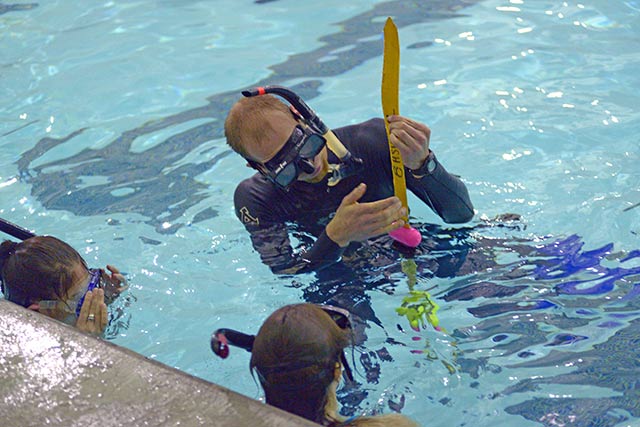Humboldt State students have taken note, encouraging others to sign up for the SCUBA classes taught by Richard Alvarez and Steve Monk. The program’s popularity has exploded, but the student experience remains the same.

“Our students come from a broad spectrum of majors,” Alvarez said. “With all of them, it’s fun to watch the discovery process and the wonderment of their first dive.”
Those enrolled in one of the two beginning classes taught each semester have found SCUBA to be more than a leisure pursuit. Many continued in the advanced and scientific diving sections with career enhancement as an objective.
“I got involved in the diving classes because as a Marine Biology major I thought it would be helpful to use skills and my love of diving to become a certified scientific diver,” said Frankie Moitoza, who serves as a teaching assistant in the beginning class and will graduate this spring with a minor in Scientific Diving. “We have one of the few undergraduate scientific diving programs and we also have the rescue diver class, which greatly increases the ability to get a diving-related job.”
Students in the beginning class start out by learning safety techniques that are prominent throughout each stage of instruction. Most of their time is spent in the swimming pool, where they gain experience clearing their snorkel, kicking fins, using weight belts, and finally, SCUBA tanks.
Three trips to dive sites are included in the class, with the Mendocino coast the common destination. Divers taking the advanced and scientific classes are given the option of traveling for a dive at Catalina Island, off the Southern California coast.
Like Moitoza, Daniel Gardner helps out as a teaching assistant, providing an instructor-to-student ratio that reinforces safety during diving expeditions. He was already interested in diving when he first arrived on campus, but had no idea HSU offered classes in what he enjoyed as a weekend hobby.
“I didn't know the program existed when I transferred here, but had I known, it would have just been another reason for me to want to come to HSU,” Gardner said. “When I heard about the minor, I decided I might as well pursue it, since I was already a full time student, and the certifications I would receive from it anyway made it worth the time.”
Being certified and trained in scientific diving, in particular, provides valuable experience that could lead to employment. Search and rescue, marine biology, geology, archaeology, and many commercial applications are among careers in which diving can be a valuable asset.
“If you are trained and certified here, in this demanding environment, you are prepared to dive anywhere,” Alvarez said. “The rewards are great, too. You can see colorful fish and ocean life like you do in the tropics, but there’s a lot more going on. We have rocky reefs and dense kelp forests that you don’t commonly find elsewhere.”
Visibility is one of the local obstacles, and the cold water is another challenge, Alvarez said. Neither aspect is enough to diminish the constant wonders.
“I remember being on a night dive, and all of a sudden I was in the middle of an area lit up by bioluminescent plankton,” Alvarez said. “The light provided by the plankton was enough to allow me to see a school of squid swim by, then a sea lion coming in to feed on them. Those kind of wildlife encounters help me keep my perspective of what my place is in the world.”